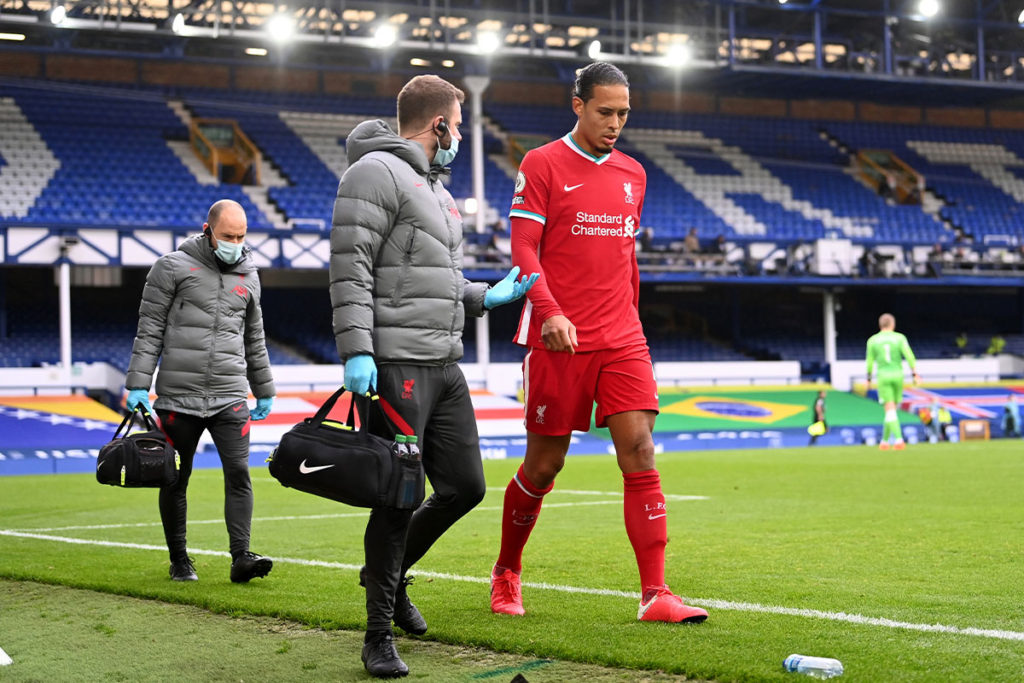The EFL had been hoping for £250m. What it was actually offered was less than 10% of that - £20m - with £30m more in loans, and only to Leagues One and Two.Having seen the package politely turned down, the Premier League will not withdraw what it regards as a decent offer, but nor is it currently minded to improve one that it came up with based on the EFL's distribution of revenue between the divisions.

What is the big picture for English football after turbulent week?
It was among the most turbulent and seismic weeks in the history of English club football.
Starting with the leak of an explosive proposal to shake up the game in a way not seen since the early 1990s, it ended with unedifying squabbles between the game’s authorities. Along the way were demands for resignations and external regulation.
Rarely, if ever, has domestic football politics felt so febrile.
Amid an unprecedented financial crisis and fraught relations with both fans and government, football’s various factions are drawing breath. So how has the past seven days impacted the sport, and what could happen next?
A bigger bailout?
It may have taken two weeks longer to materialise than the Culture Secretary Oliver Dowden had predicted last month, but on Thursday the Premier League finally came up with the bailout it had been under mounting pressure to deliver to help the English Football League (EFL) clubs cope without matchday revenue this season.
However, the Premier League has also made it clear that any club at imminent risk of going to the wall (including from the Championship) should feel free to approach it and make a case for assistance.
No club has yet done so and privately the Premier League is confident that the cliff-edge is still months away, with enough cash in the EFL thanks to player sales, parachute payments (in some cases), cost-cutting and advanced solidarity payments to ensure no clubs should go under in the next few weeks.
Furthermore, the Premier League believes that some EFL clubs are using Covid-19 as a smokescreen for overspending and unsustainable business models.
Crucially, the Premier League has drawn a distinction between making good all the losses that lower-league clubs are suffering as a result of the pandemic, which it refuses to do, and on the other hand, helping clubs to survive, which it says it will.
Premier League insiders make the point that the £30m worth of loans it has offered are interest-free and come with just two conditions – that the recipients demonstrate their losses and show there are no alternative sources of revenue. That is only to be expected, they say, at a time when their clubs are also suffering from the continued absence of spectators inside grounds.
Dowden described the Premier League’s offer as “a good start” and the government is encouraged by assurances that clubs will not be allowed to fold.
Having announced the 66 clubs in the National League will share £10m in National Lottery funding, some now expect the DCMS to try to push the Premier League into an improved offer.
But having been frustrated at how long negotiations took, and surprised by the £14.95 the top flight decided to charge fans for pay-per-view matches (especially after the £1bn that was spent in the summer transfer window), it has also been dismayed by the unedifying rows the past week has exposed. But more of that later.
What now for the EFL?
The Premier League maintains that the real problem with the EFL is not a lack of generosity in the way it redistributes TV money, nor the impact of Covid-19, but weak regulation. The EFL, however, has a different perspective.
According to one well-placed source, amid initial anger from some Championship clubs that they were being left out, its board was originally minded to accept the bailout on the basis that clubs in the lower two divisions desperately needed the help, but a number of League One clubs put solidarity ahead of self-interest and urged the leadership to politely decline.
There is still resentment by the EFL at what some have portrayed as a derisory offer. In an email to clubs on Thursday, outgoing chief executive David Baldwin told them that “it was clear from conversations that… [the offer] falls some way short of the needs of the clubs, both in respect of the value provided and the conditionality of its terms”.
Some at the EFL want to abandon any efforts to force more money out of the Premier League and have mooted applying for a Bank of England loan. Others have suggested asking government to get tougher with the Premier League by imposing a levy on broadcast revenue if a better offer cannot be agreed.
Another potential route is seeking investment from private equity backers, an avenue rugby union has taken in recent times with CVC, the former owners of Formula 1.
US investment firm TPG Capital has already had one bid turned down – worth a reported £375m in return for a 20% stake of the EFL – but BBC Sport has been told it remains interested, and that there are other suitors circling too.
EFL chairman Rick Parry is understood to be opposed to the idea of permanently handing decision-making rights over to companies that intend to make as much profit as possible. His resolve may still have been strengthened by the events of recent days.
Project Big Picture
One may think that the former Liverpool chief executive would be despondent after seeing the demise of Project Big Picture (PBP) – the plan for a smaller, 18-team Premier League to share a quarter of all TV revenue with the EFL, along with a £250m up-front payment.
The Premier League voted against pursuing the Liverpool and Manchester United-backed proposal at a meeting last week amid a major backlash by other top-flight clubs, fans and the government – who all portrayed PBP as a power-grab by the ‘big six’. However, it does appear to have brought the majority of EFL clubs closer together, emboldened Parry, focused minds and given fresh energy to the debate around the game’s future structure, scheduling and sustainability.
Already the motives behind the plan are becoming clearer. Two years ago, the big six won a greater share of overseas TV revenue as the Premier League finally compromised on the equitable distribution that had underpinned its approach since 1992. Many feared that concession was unlikely to stop them agitating for more, and so it has proved.
A key element of PBP is the idea that Premier League clubs will be able to sell eight matches direct to overseas viewers themselves. According to analysis by the Mail on Sunday, clubs could make as much as £125m for one match under such a system – twice as much as they can currently make per season from selling the rights of all 20 matches abroad.
Despite any prospect of a proper launch being wrecked by a leak to the Sunday Telegraph last weekend, those behind PBP seem satisfied that the issues they raised – including the need for a revised calendar before the likely expansion of the Champions League from 2024, and the need to bridge the financial chasm that has developed between the top tier and the rest – have now been formally adopted into a strategic review that the Premier League admitted has been given fresh urgency.
Indeed, they believe that if PBP had never happened, that review – which was meant to start in February but had lay dormant ever since – may not have been revived.
They feel the greater redistribution of broadcast revenue to the EFL, and the abolition of parachute payments, would finally give the 72 EFL clubs the stability they need. They believe that has been overlooked by the media and fans groups in the rush to condemn the governance reforms.
Having said that, there is also concern that some of the projections for overseas TV revenue included in the PBP plan may be over-optimistic, and that it may not result in as good a deal for the EFL as initially presumed.
Further, the perception of PBP as the product of “cooked-up backrooms deals” (as the government described it), has certainly been given greater context.
On Thursday, Parry revealed to his clubs that not only was Chelsea chairman Bruce Buck involved, and Premier League chief Richard Masters invited to the talks earlier this year, but Football Association chairman Greg Clarke had in fact “initiated” them, and even produced a discussion paper featuring ‘B teams’ and ‘Premier League 2’ as examples of reforms.
That enraged some in the EFL and perhaps in normal times there would be greater pressure on the position of Clarke, who has kept a remarkably low profile in recent months, despite the challenges facing the sport.
The architects of PBP are understood to be ready to work with the Premier League’s review process – but the league now knows that the owners of its two biggest clubs are unhappy with the status quo and expect changes.
As if that was not enough to contend with, additional pressure has been brought by the government’s threat of a fan-led review and calls for an independent regulator by a group backed by Gary Neville and former FA chairman David Bernstein.
The basis of their argument is that English football is too riven with self-interest for it to be able to bring about the changes it needs. And some believe the past few days has proved their point.
“A fan-led review must now happen as a matter of urgency,” Tracey Crouch, the former sports minister, told BBC Sport.
“The stand-off between the Premier League and the EFL requires independent mediation. PBP has exposed significant self-interest at the top of the game and the Premier League, despite its superior regulation, is no longer exempt from examination.
“Independent regulation is not a new idea but the past few weeks have quickened the pace towards it.”
The coronavirus crisis has laid bare the tensions and forces that have been bubbling beneath the surface of the English club game for years.
In doing so, it has accelerated the speed at which potential changes may arrive, and forced many to consider what they want football to look like going forward amid a shifting financial and media landscape. It may have been ugly at times, but at least football’s various factions now know where each other stand.
Original article 18.10.20 on the BBC Sport website.
To view the original article click here
© The Fan Experience Company 2020
